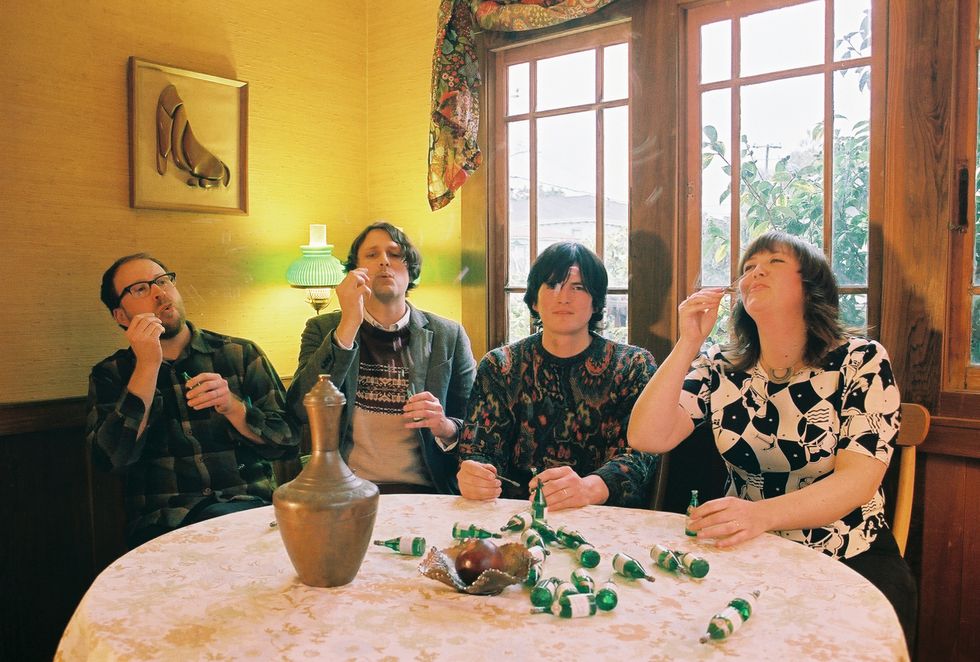Last month The Mantles issued their second full-length album, Long Enough To Leave (Slumberland Records), followed by a “fun as hell” record-release show at Oakland’s White Horse Tavern. They’ve played both sides of the Bay (band members live in Oakland and San Francisco), and will hit up the East Coast for the next couple of weeks to tour. We talked to Michael Olivares (vocals, guitar) and Matt Roberts (Bass) about recording with Kelley Stoltz, how two band mates got “hitched” during the process and what they think of the term, "60s revivalists."
When I pressed play on the first track I immediately thought of how the jangly guitars reminded me of The Byrds. The track is even called “Marbled Birds.” Was that homage in any way?
MR: Who doesn't like The Byrds? [Roger] McGuinn's 12-string is the most heavenly sound. I don't think we've ever consciously tried to ape, or pay homage to The Byrds, but if you put an electric 12-string on anything, you're paying homage to McGuinn by default.
Was there a different approach in recording this album compared to your first? What did you learn to do different since then?
MO: Perhaps we were a bit more confident this time around. When we recorded our first album, several of the songs were still in need of lyrics. It was our first time you know, so allow us to be nervous. We sorta let Greg Ashley tell us where to position ourselves, play, and record. He had a pretty sweet set up though, with huge rooms for natural reverb and amazing analog gear. At Kelley Stoltz’ studio we were very well rehearsed, and played our songs in an almost cavalier manner.
MR: I think this time around we tried to have everything a little bit more together on the way in.
How long did it take to record this album?
MO: It took longer than it should have. We started off on a solid burst, but then various “life” situations came in and rocked the boat, so to speak. Virginia (drums) and I had to take some time away from the recording to get hitched so that definitely prolonged the process.
What studio did you record in? What was Kelley Stoltz’ role in recording this LP?
MO: This album was captured at Kelley’s’ very own Electric Duck Studio, which basically is a converted garage in the back of his house in the Mission.
MR: Kelley was patient as hell with us, but it was also an experiment for him as well. I suppose I'd say he "co-produced" with the band (if we were a band to use terms like that). He definitely played a lot of keyboards and synth and stylophone, and also did a fair amount of backing vocals. He's a super talented guy. We had most of the songs pretty well worked out, but he helped us when we were stuck and added some great stuff.
Is there enough new psych, folk and garage bands for you to draw solely on your peers for inspiration (thinking of Thee Oh Sees, Ty Segall, White Fence, etc.) or are you primarily drawing from the originality of music from the 60s as your main influence?
MR: We are probably a little older and don’t go out as much, so you'd be surprised how little we see bands that are considered our peers! And we've only played with the above bands a handful of times. Honestly I don't feel like we are influenced by them. Ty and John Dwyer are in a different realm as far as live performance, so we humbly stake our corner in the bar across the street.
MO: As for the 60s sound, I don’t think there can ever be enough of this type of music. It possesses a quality of timelessness, not unlike denim. Both the bands of today and the bands of the past can be inspiring. The only aspect that can give the bands of today a more inspiring edge is that they are alive. You can actually go and see these bands doing this music live. Usually even smell them.
If someone mislabels your music does it bother you much?
MR: To be honest, it's kind of annoying when we get called 60s revivalists! Sure it's garagey–we're sloppy and we play old beat-up amps and we like the sound of a 12-string, but seems too easy for people to say that. We just do our own thing and it would sound really dorky if we went chillwave.
This album is lovely, seamless, and easy to listen to. It draws upon the elements of one of music’s more popular eras. What’s keeping me from going back to the 60s and putting on my Doors 2-CD comp instead of new music?
MR: Honestly, if you have a choice between the Mantles and the Doors, by all means, take the Mojo Man all the way. What's next— us or the Beatles? We are friends who hang out and have some beers and get really excited when we think we have a song worth playing for people. Our loftiest goal is to have a song that someone connects with and might remember. Michael is my Lizard King.






















